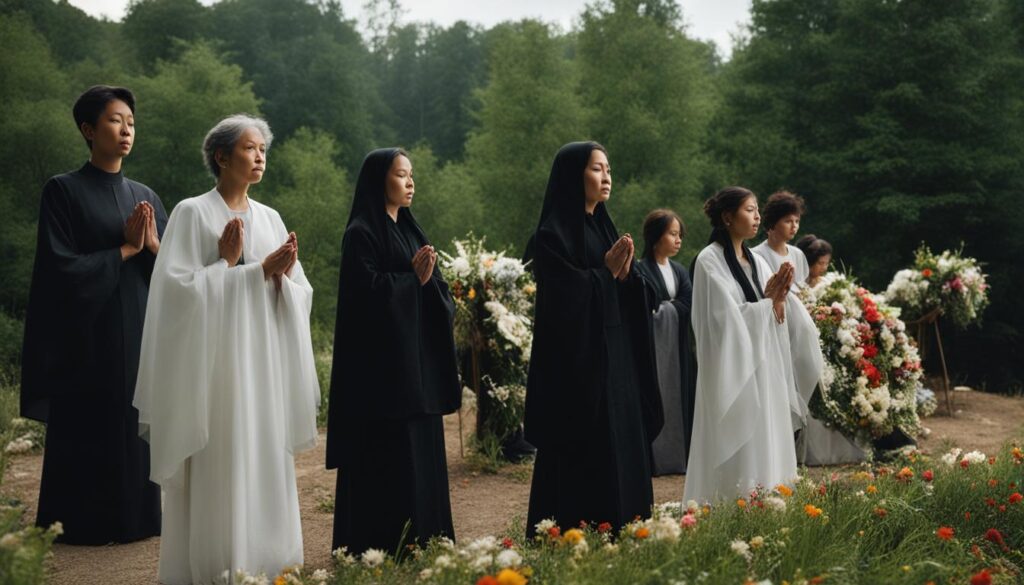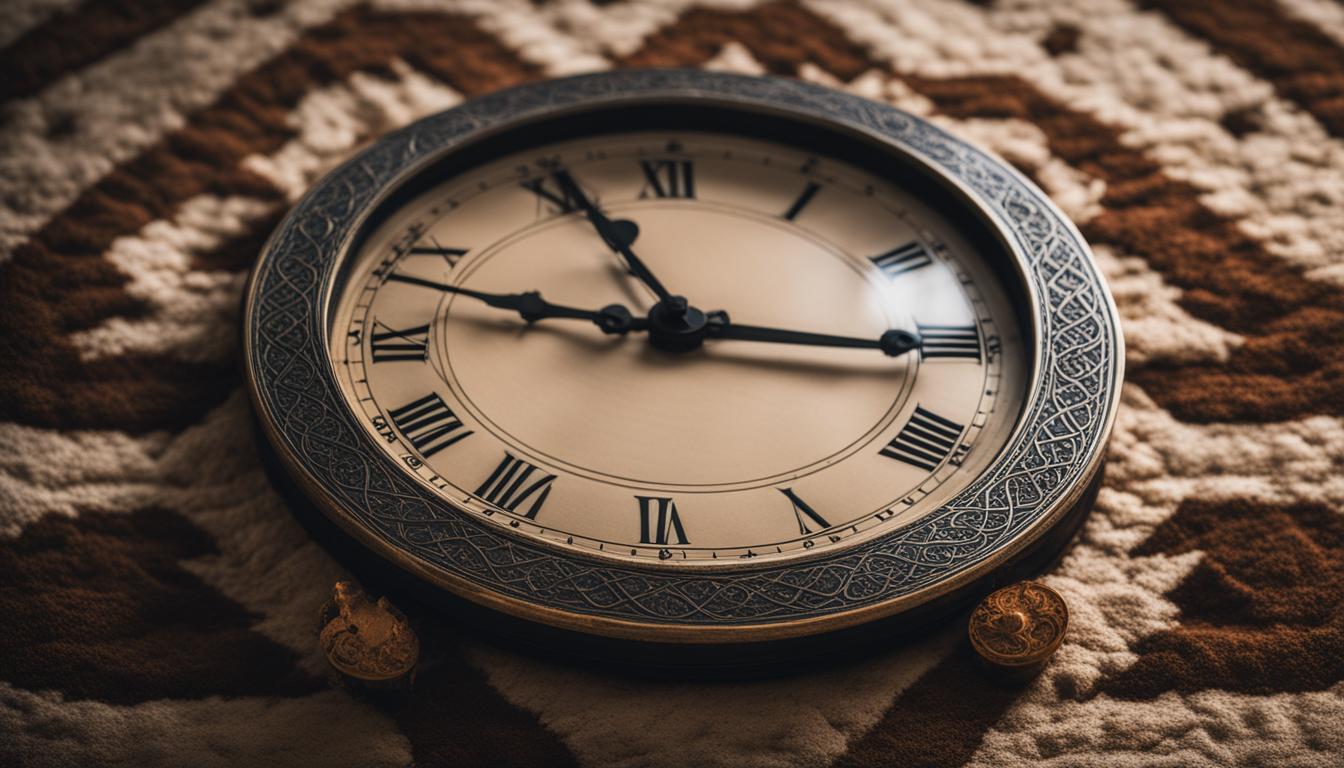When it comes to Muslim funeral services, one might wonder how long they typically last. Whether you’re attending or planning such a service, it’s important to have an idea of the time commitment involved. The duration of a Muslim funeral service can vary depending on various factors, so let’s explore the general timeframe you can expect.
Key Takeaways
- A typical Muslim funeral service lasts between 30 to 60 minutes.
- The service is a community event where group prayers are offered for the deceased and all deceased Muslims.
- The funeral is held at a mosque or a location where the community gathers.
- After the prayers, the body is taken in a silent procession to the burial site.
- Cremation and autopsies are discouraged due to the belief in a physical resurrection of the body on Judgement Day.
Islamic Funeral Rites and Traditions
In Islamic funeral rites and traditions, there are several important rituals and customs that shape the duration of a Muslim funeral service. One of the key customs is the prompt burial of the deceased, typically taking place within 24 to 72 hours after death. Unlike other funeral ceremonies, there is no viewing or wake during an Islamic funeral. Instead, the body is washed, covered with a sheet, and transported to the location of the funeral, usually a mosque or a designated community gathering place. This efficient process allows for a focused and direct commemoration of the deceased.
During the funeral service, attendees gather to participate in prayers led by the Imam. The lines are formed based on gender and age, fostering a sense of unity and equality within the community. The prayers are a collective act of supplication for the deceased and all deceased Muslims. Following the prayers, the body is respectfully taken to the burial site in a silent procession. Each person present has the opportunity to throw three handfuls of dirt into the grave, symbolizing a final farewell and the return of the body to the earth.
Maintaining the Traditions
Islamic funeral rites prioritize adhering to key customs and beliefs. Embalming and moving the body away from the place of death are generally avoided to ensure the preservation of the body’s integrity. Cremation is strictly prohibited due to the Islamic belief in the physical resurrection of the body on Judgement Day. By upholding these traditions, Muslims honor their faith and pay respect to the deceased.
It is important to note that Islamic funeral ceremonies may vary slightly based on cultural practices and regional customs. However, the underlying principles of prompt burial, community involvement, and adherence to Islamic beliefs remain intrinsic to the overall process.
Islamic Funeral Etiquette
Attending a Muslim funeral is a solemn occasion that requires adhering to certain etiquette guidelines. It is important to show respect and sensitivity to the customs and traditions of the Islamic faith. One of the key aspects of Islamic funeral etiquette is maintaining a sense of decorum and solemnity throughout the ceremony.
Mourner Conduct
During a Muslim burial ceremony, it is important to refrain from engaging in behaviors that may be considered disrespectful or sacrilegious. This includes avoiding loud wailing, tearing of clothes, and self-injury. However, it is permissible to express grief through tears. The focus should be on honoring the deceased and offering condolences and support to their loved ones.
Attire and Participation
When attending an Islamic funeral, it is customary to dress modestly out of respect for the religious customs. Men should wear a shirt and trousers, while women are required to wear a headscarf, ankle-length skirt or dress, and a shirt with long sleeves and a high neckline. Additionally, both men and women should ensure that their clothing is clean and presentable.
Non-Muslims are welcome to attend Islamic funerals and paying respects to the deceased and their family is appreciated. It is important to be mindful of Islamic customs and follow the lead of the Muslim community. This includes joining in the prayers and remaining respectful throughout the ceremony.
Supporting the Family
After the burial, it is considered thoughtful to offer support to the family during the mourning period. Bringing flowers and food to the family’s home as a sign of condolence and support is a common practice. Additionally, providing emotional support and attending to the needs of the grieving family is highly appreciated.
In conclusion, observing Islamic funeral etiquette is essential when attending a Muslim burial ceremony. Showing respect, dressing modestly, and offering support to the bereaved family are all considered signs of compassion and understanding. By adhering to these etiquette guidelines, mourners can contribute to creating a comforting and respectful environment during this time of loss.
Dress Code for an Islamic Funeral
When attending an Islamic funeral, it is important to dress in a manner that shows respect for the deceased and their religious beliefs. Both men and women should adhere to a modest dress code to ensure that their attire aligns with Islamic customs and traditions.
For men, it is recommended to wear a shirt and trousers. This demonstrates a modest and respectful appearance. It is also advised to wear clean socks, as shoes are typically removed before prayers at the funeral service.
Women attending an Islamic funeral are required to cover their hair with a headscarf. Additionally, they should wear an ankle-length skirt or dress and a shirt with long sleeves and a high neckline. This conservative attire is in accordance with Islamic principles of modesty.
By dressing appropriately and modestly, attendees show their respect for the solemn occasion and the religious beliefs of the Muslim community. It is important to remember that an Islamic funeral is a time for mourning and reflection, and appropriate attire demonstrates sensitivity and understanding.
Muslim Funeral Burial Process
The Muslim funeral burial process is a solemn and dignified ceremony that follows specific customs and traditions. After the funeral service, the deceased is taken to the cemetery for burial, where the final rites are performed. Traditionally, only men are allowed to attend the burial, although some Muslim communities may permit women as well. It is important to note that the duration of a traditional Muslim funeral may vary depending on the specific customs and practices observed by the community.
During the burial, the body of the deceased is placed in the grave with the right side facing Mecca, the holy center of Islam. This positioning symbolizes the deceased’s readiness for resurrection and judgment in the afterlife. To prevent direct contact with the soil, wood or stones are placed on top of the body. As a final act, mourners pour handfuls of earth onto the grave, signifying the return of the deceased to the earth.

The mourning period in Islamic funerals is a time of reflection, remembrance, and support. It allows the family to mourn their loss while receiving the comfort of their community. The structured period of mourning helps them navigate the grieving process and find solace in their faith and the memories of their loved one.
Conclusion
In conclusion, the average time for a Muslim funeral service typically ranges from 30 to 60 minutes. However, it is important to note that the duration may vary based on the specific customs and traditions followed by the community.
Islamic funerals prioritize a quick burial, with the body being washed, covered, and transported to the funeral location for prayers. The funeral is considered a community event, and attendees gather at a mosque or a designated location to pay their respects and offer prayers for the deceased.
The burial itself is conducted with utmost respect to Islamic beliefs and customs. The deceased is placed in the grave with the right side facing Mecca, and mourners pour handfuls of earth on top as a final act. Cremation and autopsies are discouraged in Islam, as Muslims believe in the physical resurrection of the body on Judgement Day.
During the mourning period that follows the funeral, which lasts for 40 days, the family of the deceased receives support from the community. This period allows them to grieve and come to terms with the loss with the assistance of their loved ones and friends.
FAQ
How long does a Muslim funeral service typically last?
A Muslim funeral service typically lasts between 30 to 60 minutes.
What are the main rituals and customs in Islamic funerals?
The main customs in Islamic funerals include a quick burial within 24 to 72 hours, no viewing or wake, washing and covering the body, funeral prayers led by the Imam, burial site procession, and throwing three handfuls of dirt into the grave.
What is the etiquette for attending an Islamic funeral?
Etiquette for attending an Islamic funeral includes dressing modestly, avoiding loud wailing and sacrilegious speech, and being respectful of Islamic customs.
How should men and women dress for an Islamic funeral?
Men should wear a shirt and trousers, while women are required to wear a headscarf, ankle-length skirt, and a shirt with long sleeves and a high neck.
What is the process of burial in a Muslim funeral?
After the funeral service, the deceased is taken to the cemetery where the body is placed in the grave with the right side facing Mecca. Mourners pour handfuls of earth on top of the grave as a final act.
How long is the mourning period in Islamic funerals?
The mourning period in Islamic funerals typically lasts for 40 days, with widows having a longer mourning period of 4 months and 10 days.

